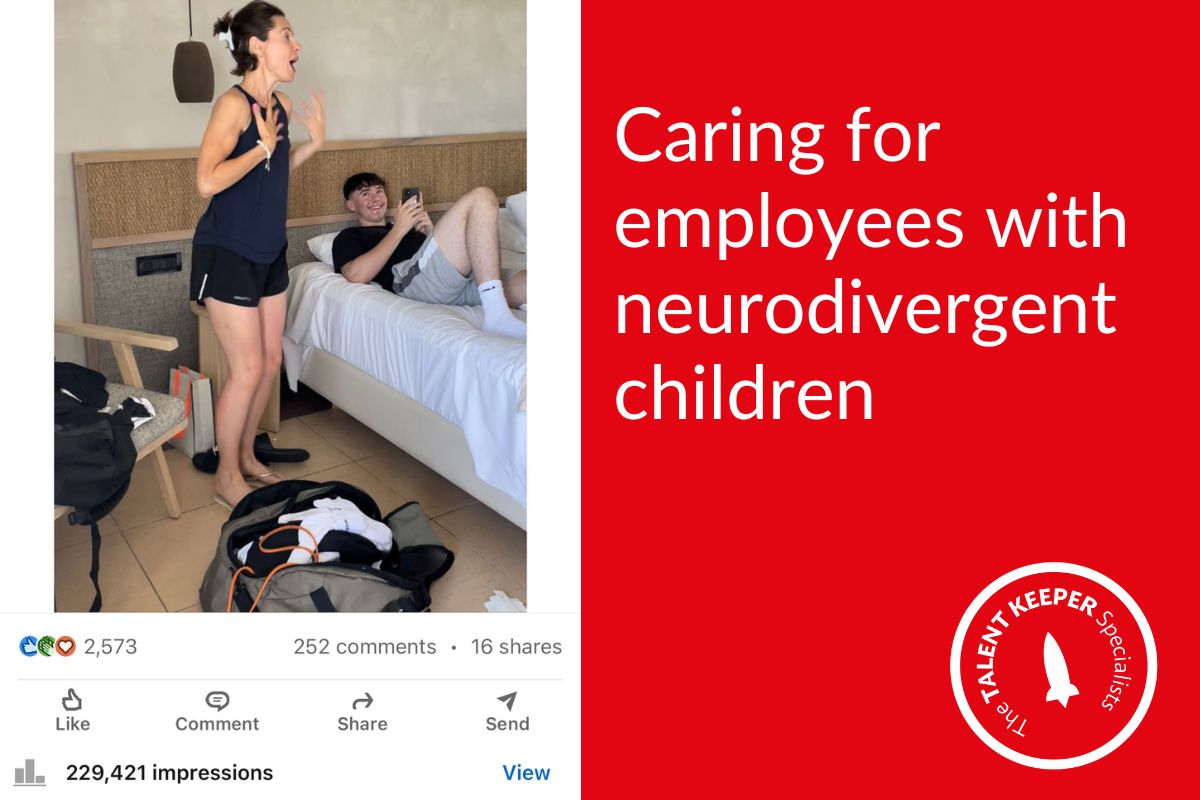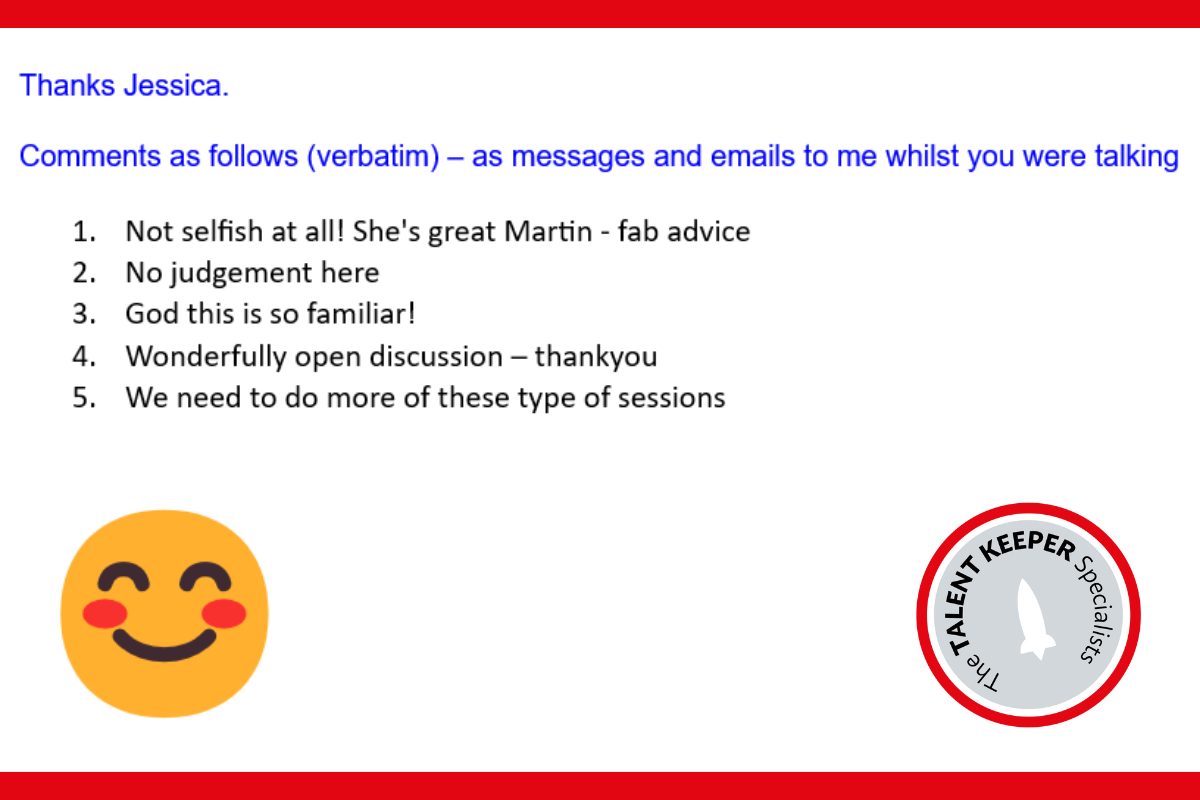Caring For Employees With Neurodivergent Children – Responses to 7 Qs
Caring for employees with neurodivergent children is close to my heart, writes Jessica Chivers, coaching psychologist and founder of The Talent Keeper Specialists.
“Last year my son was permanently excluded from school four months ahead of his GCSEs for ‘persistent disruptive behaviour’ and six weeks later my daughter was diagnosed with anorexia. My son was diagnosed with atypical autism, ADHD and secondary anxiety when he was 11. He smashed his GCSEs and my daughter is back in the right weight for height bracket…and I’m on my own journey to a probable ADHD diagnosis this autumn”.
That’s how I opened the session I did last week with one of our client organisations for their employee resource group (ERG) for colleagues with neurodivergent children. What follows are the notes I prepared for myself in response to some of the questions that were sent in advance.

This is a picture of me and my son on GCSE results day on holiday in Kos. I posted his story – with his permission – on LinkedIn the same day and the response was phenomenal.
Line manager trust & WFH = two vital ingredients for employees with challenging home lives
What emerged in the Q&A, which was extremely well-attended might I add…more employees are affected than you might think, is the career-changing magic of a line manager who trusts you to get your job done and a culture which is supportive of WFH.
When the sh1t hits the fan at home and you’ve got the ability to WFH + a line manager who trusts you, the Sh1t doesn’t smell as bad, doesn’t take as long to clean up and doesn’t derail you as much as it otherwise might.
The Economist reported last month that whilst latest research on remote workplace productivity shows a decline when working from home, there is more to work (and life) than productivity. I quote: “Perhaps the greatest virtue of remote work is that it leads to happier employees.”

7 Questions from employees with neurodivergent children
- How do you stop that moment impacting your whole day, whilst trying to be there for them but also knowing that she needs to get to school and I need to get to work and not all be late?
- How do you get ready mentally after a busy day at work and need the energy to parent when there are other challenges awaiting for you at home
- What advice would you give to parents when their child goes mute and won’t communicate in any way?
- In your opinion what is the best way to communicate with a child’s school?
- How do you make sure you have time for yourself?
- What do you say to people when they say “But isn’t everyone a little bit autistic?”
- Anxiety and being Neurodivergent seem to go hand in hand, why do you think that is?
Due to many reasons my mornings might not go to plan, something might throw me off like suddenly the PE shorts that my daughter has been wearing feels too uncomfortable and can result in overwhelm whilst trying to hurry out the door. How do you stop that moment impacting your whole day, whilst trying to be there for them but also knowing that she needs to get to school and I need to get to work and not all be late?
- My approach was to start building in buffer at the start of the day in case something went wrong. When we’ve been through our worst times I would get my PA to start my day at 9.30am so I had time to soothe myself, re-do make-up if there’d been tears and just get my head together.
- I think it’s good to have someone you can be really honest with and who can perhaps speak for you on these occasions – this is someone you can call and say “I’ve had a shit start, I’ll be in at X time and I am fine and don’t need to talk about it OR I’m not fine but I don’t want to talk about it.” This person can then do that necessary communication for you.
- It’s worth taking 5-15 minutes longer than you need to get your head together before going into work. I think it’s better to be fractionally later than you need to be and present yourself in a better state than get there 5-10 minutes sooner but still be mentally jangling.
- Journalling, singing and dancing, walking and some vigorous cleaning have all been my quick go-to solutions to getting my mind in a better state.
- In this specific situation about the shorts, I learned that when things like this happened to be able to quickly think of two options that are both palatable to you:
- “OK, I hear you and we can get new shorts at the weekend. Today you’ve got two choices: 1) you can wear those shorts for your PE lesson for 50 minutes even though they’re a bit tight OR you can wear your tracksuit bottoms and I will send a note. I’ll give you five minutes to decide.” This would have worked with my son because I: a) acknowledged him, b) showed I understood where he was coming from, c) gave him some power and d) showed him a solution was coming and when it was coming.
How do you get ready mentally after a busy day at work and need the energy to parent when there are other challenges awaiting for you at home with a child that has masked all day, tiredness, sensory issues.
Give yourself a physical and mental breather before you enter your home or step out from your home work space.
With young children as soon as they see you they think you’re available so it’s probably easiest if you take your rest before you enter your home (if you’re working outside of home) or if you’re working at home, to take it inside the room you’ve been working in. Or sneak out of the front door!
With older kids you can ‘train’ them to understand and respect that although you’ve finished your work, it’ll be X many minutes until you’re ready to come and give them your attention. This is then your space to leave the house for a walk; go into the garden to pull some weeds or do something else to refresh and reset yourself – like lying on your bed with your eyes closed with a meditation app or some music.
What advice would you give to parents when their child goes mute and won’t communicate in any way?
I can’t speak to this I’m afraid – The National Autistic Society could be a useful port of call.
Speaking to school about what they notice there is probably a good idea.
Is there someone in the family or a friend that the child is communicating with?
In your opinion what is the best way to communicate with a child’s school?
Honestly, as frequently as need, with respect, acknowledging what they HAVE done that’s been positive; be clear about exactly what you want to happen (if you know what that is). I fell into a bit of an apologetic pattern with my son’s school and felt terrible about the amount of time the DH was spending sorting situations out, thinking “Imagine if every child was like mine and he had to do this much work for every child?” but of course my son was an outlier, the school wasn’t dealing with 200 kids per year group like my son.
I think documenting everything is a really smart idea. Follow-up in-person meetings with an e-mail saying thank you and bulleting key action points or agreements.
How do you make sure you have time for yourself?
If you have a very, very difficult situation at home it’s vital to build in time for you to be away from the complexity and the burden. I have learned this through experiencing times when I didn’t feel good at all. Taking time out can mean the difference between life and death at its most extreme. Less seriously it can mean the difference between staying married and getting divorced. It can mean the difference between staying physically and mentally well and using wholesome coping strategies and becoming addicted to alcohol, drugs or food as a comfort.
What do you say to people when they say “But isn’t everyone a little bit autistic?”
I say that’s not true and it’s called Autistic Spectrum Disorder because the severity exists on a spectrum. The spectrum doesn’t mean everyone is on it. I think people who say this are well meaning and they’re trying to be inclusive but it’s not true and I don’t think it’s helpful.
You might have heard of the Diagnostic and Statistical Manual of Mental Disorders – this is the ‘Bible’ for psychiatrists and psychologists and sets out the criteria for a person being diagnosed with any mental condition.
You’re not on the spectrum until you hit certain criteria.
Anxiety and being Neurodivergent seem to go hand in hand, why do you think that is?
Trying to fit into a neurotypical’s world.
Resources
A flavour of resources we flagged in the session:
- The Explosive Child by Dr Ross Greene
- Diagnostic & Statistical Manual
- What is an EHCP?
- National Autistic Society
- QbCheck for ADHD
How can we help you?
Q&As like the one we were part of at Stantec is great for building a sense connection between colleagues. As the number of children being diagnosed grows (because of greater understanding and recognition) the more this is a matter of interest to your parent employees.
Parents who have challenging circumstances do well to have a listening ear open to them. If you’d like to find out about hiring some of the team to provide ad hoc coaching sessions one day a month, please get in touch. There are three of us who are very well versed in the challenges of parenting non-neurotypical children.





Leave a Reply
Want to join the discussion?Feel free to contribute!